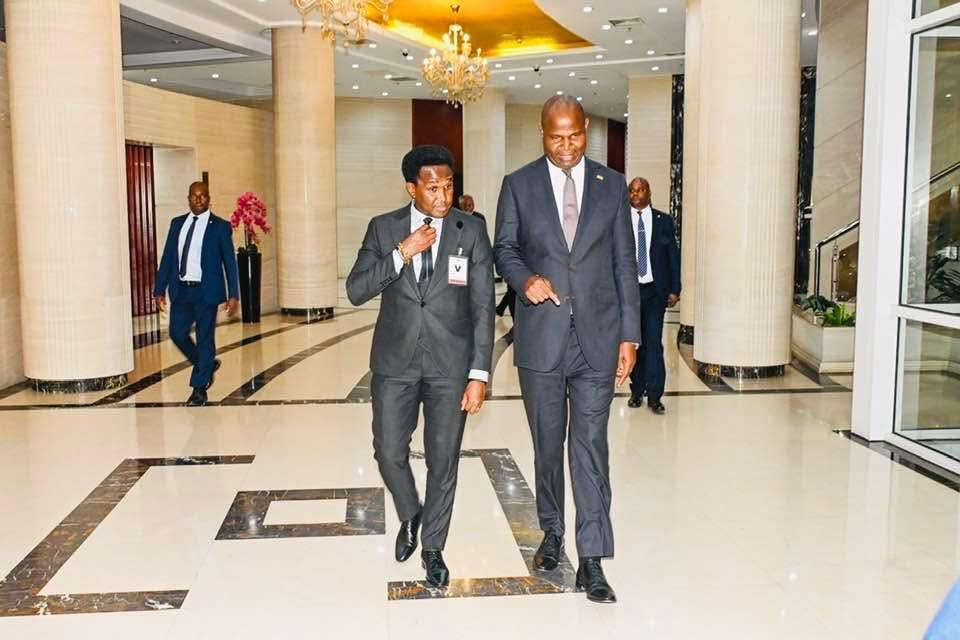Africa-Press – Mozambique. Mozambican President Daniel Chapo and the country’s main opposition leader, former presidential candidate Venancio Mondlane, met for the second time on Tuesday.
In a release from the presidential office, Chapo said the meeting was held “in the framework of the inclusive political dialogue with all strata of society”, and in “an environment of mutual respect and patriotic spirit”. The meeting “was centred on the promotion of peace, reconciliation and stability”.
At the end of the meeting, Chapo stressed dialogue as an essential instrument for the construction of a peaceful and prosperous country. “Peace, reconciliation, forgiveness, harmony and brotherhood between Mozambicans is very important”, he said. “Hence, our objective is to hold a dialogue with the purpose of attaining and consolidating peace and reconciliation, because there is only development when there is peace and security. We can only achieve peace by entering into dialogue with all strata of society”.
During the meeting with Mondlane, Chapo stressed his commitment to national unity and to reconciliation among Mozambicans. The future of the country, he said, depends on the contributions of all its citizens, regardless of their political beliefs.
Mondlane described the meeting as “productive” and “positive”, while recognising that there remain points of disagreement. He was particularly concerned at the continued detention of protestors who were arrested following the unrest in the wake of the declaration, in December, of general election results widely regarded as fraudulent.
“We need a clear vision, with deadlines, of how we are going to deal with this matter”, said Mondlane.
He was also concerned at the continued violence, despite his first handshake with Chapo on 23 March. Mondlane gave Chapo a copy of the report he had presented to the Attorney-General containing evidence of these cases.
Despite the challenges, Mondlane said the two leaders had reached “mutual understanding” on six points, including deadlines for implementation. “What is important is that from now on we must monitor this, for the benefit of our population”, he stressed.
Chapo reaffirmed that he was holding channels open to listen to and discuss “with all the relevant actors in Mozambican society. We shall continue to hold meetings with all Mozambicans so that we can continue to work and develop our country”.
Both men, the Presidential release said, stressed the importance of “an inclusive and constructive dialogue as a fundamental pillar for the strengthening of democracy and for a joint search for sustainable solutions to the challenges of national development”.
A statement published by Mondlane on his website said he and Chapo had agreed to work “to eliminate all the foci of violence between the parties. It was agreed that the structures of the government and of Venancio Mondlane’s political project, at provincial and district level, should replicate the consensus achieved centrally”.
They should also make viable an amnesty for all those detained during the post-election unrest and guarantee free medical treatment for all those who had been injured.
The agreement on “inclusive dialogue”, signed by Chapo and the leaders of political parties on 5 March, did not include Mondlane since, at the time, Mondlane did not head any political party. He did not attend the initial meetings between Chapo and the party leaders – even though there is no doubt that Mondlane has a much larger following than any other opposition leader.
The situation has changed, in that Mondlane has now set up his own party, Anamalala. This is an acronym standing for “National Alliance for a Free and Autonomous Mozambique”. But it is also a word in the Makua language meaning “it’s going to finish” – and the “it” in question is the political system led by the ruling Frelimo Party.
Signing up to the March agreement on dialogue provides no guarantee that a political party will not suffer police attacks. Last Sunday, the police attacked members of the Mozambique Democratic Movement (MDM) who were attempting to hold a peaceful march in the town of Gorongosa, in the central province of Sofala, to celebrate the elevation of Gorongosa to the status of a town.
According to MDM leader Lutero Simango, the attack was unprovoked, and about 50 MDM supporters were injured in the clash. He said the police assault had “political motivations” and was undermining dialogue.
On Tuesday, Vitano Singano, the leader of Democratic Revolution (RD), one of the minor parties that signed the agreement on dialogue, was released after six months of imprisonment.
He must present himself every five days to the Office for the Fight against Organised and Transnational Crime, which is interrogating political figures detained in the wake of the post-election violence.
The Public Prosecutor’s Office has accused Singano of conspiring against the security of the state, including the supposed coordination of a plan to attack Ponta Vermelha (the official residence in Maputo of the President) as part of the demonstrations denouncing the election result.
The problem for prosecutors is that, even if such a plan ever existed, it was not put into practice and there was no attempt to storm Ponta Vermelha. Despite the apparent lack of evidence, Singano was arrested on 8 November and held until Tuesday.
On leaving the Maputo City Law Court on Tuesday, Singano, interviewed by the independent television station, TV Sucesso, declared his innocence and described his imprisonment as “unjust”.
Singano, whose party is a breakaway from Renamo, declared “I will never be a corrupted leader. I will always be incorruptible, the voice of the voiceless, the lawyer of my nation”.
He promised that he would do what he could to be a partner of the government of the day.
For More News And Analysis About Mozambique Follow Africa-Press






